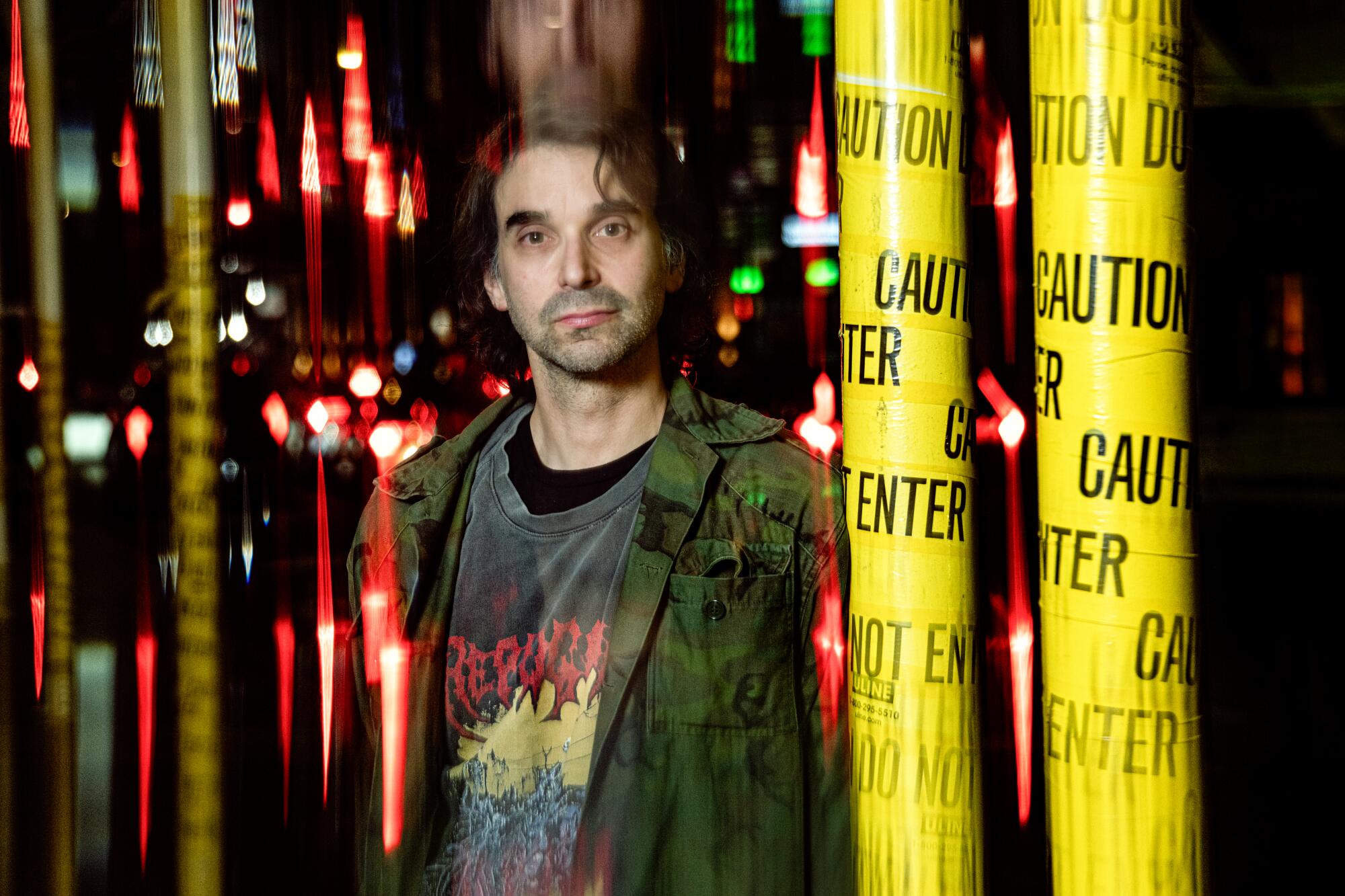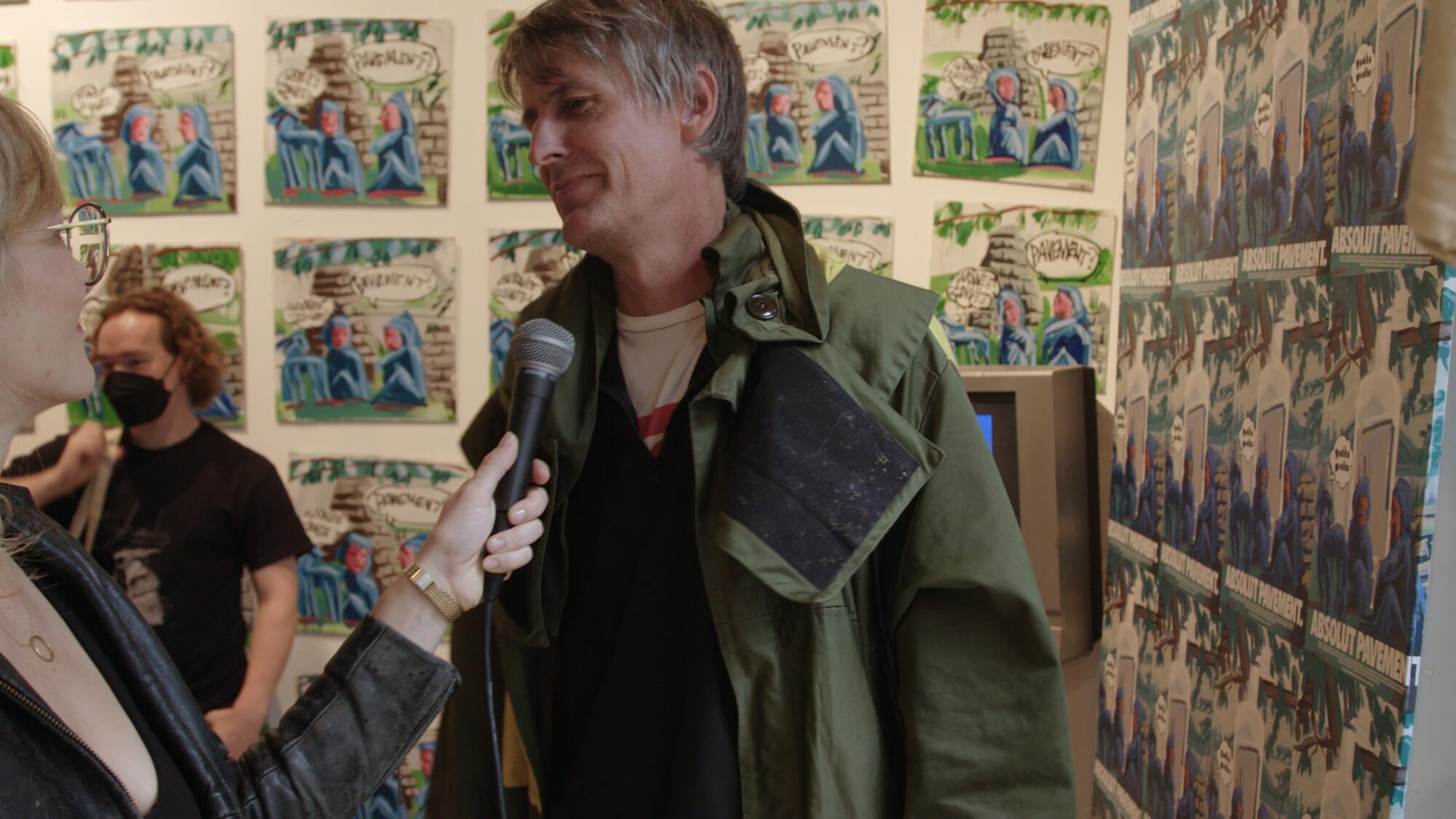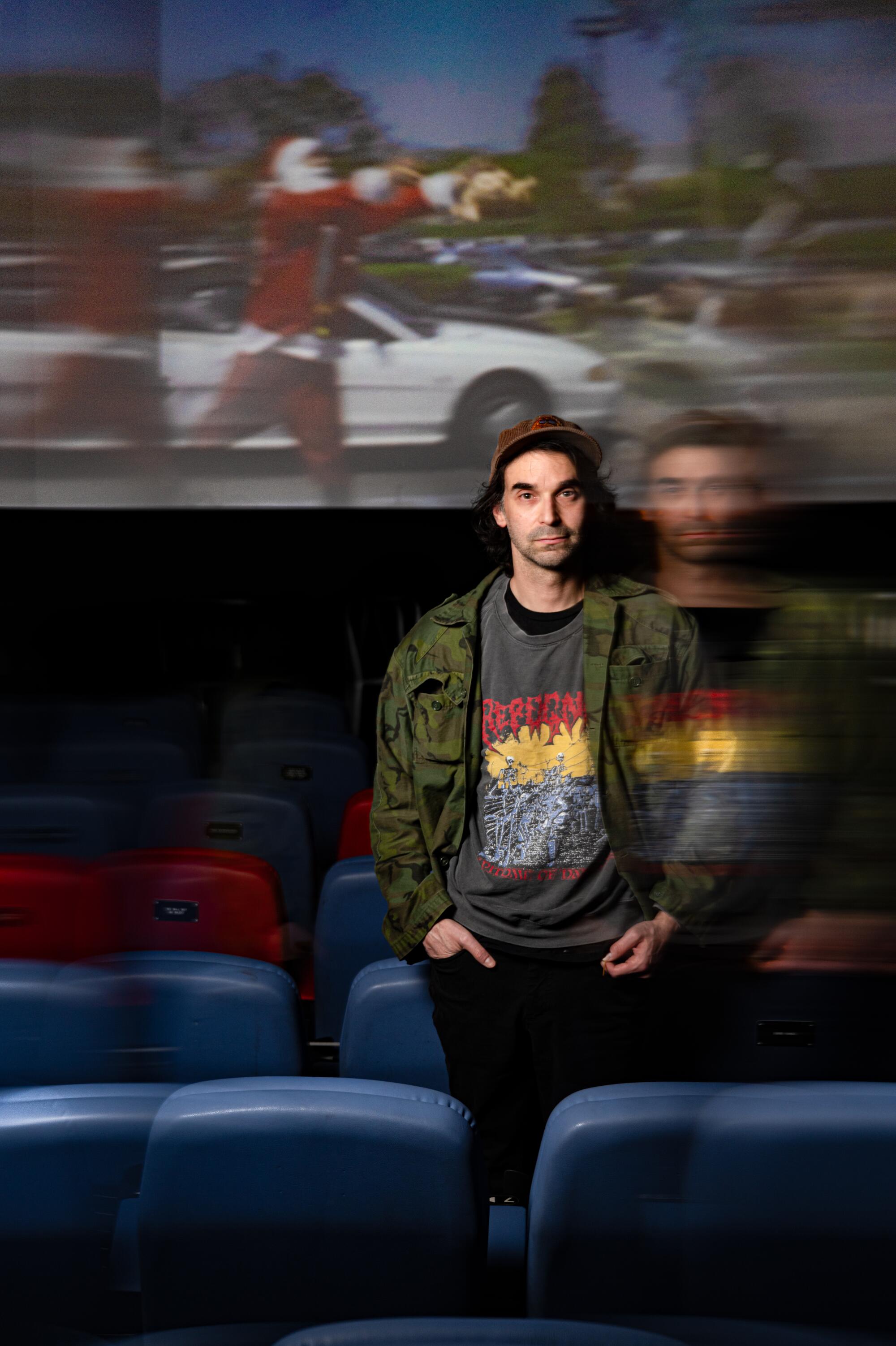
Throughout its career in the 1990s, the band Pavement remained poised for a wider commercial success that it never quite found. As leaders of the lo-fi indie rock sound, the musicians remained something of a secret passed among fans, their air of willful inscrutability, ambivalence toward conventional success and general irreverence inspiring a dedicated faithful that has only grown over the years.
The new film “Pavements” is a fittingly unconventional one for this most unconventional of bands, combining documentary footage from a wildly successful 2022 reunion tour along with scenes from the production of an improbable jukebox stage musical, an exhaustive art gallery dedicated to the group’s ephemera and a parody of a prestige Oscar-baiting biopic — all of it created especially for the movie.
For director Alex Ross Perry, it boiled down to the admittedly unanswerable question of whether the band in its time could have been bigger than it was. Then he had a lightning bolt of inspiration.
“I wanted to make a movie from the perspective of Pavement [being] — as we say onscreen in the film — the world’s most important and influential band, because that is literally true to 100,000 white Gen-X nerds,” says Perry on a recent Zoom call from his home in upstate New York.
“So what if the movie takes that not as a premise but as a fact?” asks Perry. “And builds a fictional world where this music has inspired these other things people build as shrines to their favorite musicians — a museum, a Broadway show, a crappy biopic? Let’s just do that and presume that is the cultural footprint of Pavement.”
In an unexpected stroke of luck, during the years it took Perry to see his ambitious project through, a 1999 B-side called “Harness Your Hopes” became the band’s biggest hit ever, thanks to social media algorithms. Suddenly the success that had always eluded Pavement was happening at a level never seen before.

The initial impulse behind the film came from Pavement’s longtime record label. Chris Lombardi, founder of Matador Records, recalls first pitching Perry’s idea to Stephen Malkmus, the band’s notoriously laconic chief songwriter, singer, guitarist and nominal leader.
“The idea was to make it confusing and weird,” says Lombardi in a phone interview from Los Angeles, about explaining the concept to Malkmus. “He was laughing about it and was like, ‘If it sucks, the songs are pretty bulletproof.’”
Perry, 40, is best known for seriocomic indie films such as “Listen Up Philip” and “Her Smell.” He also recently co-directed “Rite Here Rite Now,” a concert film for the Swedish metal band Ghost that also blended fictionalized elements.
The invented stage show, “Slanted! Enchanted! A Pavement Musical,” included arrangements of the group’s music by Keegan DeWitt and Dabney Morris and starred Michael Esper, Zoe Lister-Jones and Kathryn Gallagher. It was mounted for a few nights in New York City. The museum show in NYC’s Tribeca, “Pavements 1933-2022: A Pavement Museum,” mixed genuine memorabilia from the band’s history with made-up awards, gold and platinum records the band did not actually earn, advertisements it was not really a part of and ephemera such as a toenail clipping supposedly from Gary Young, the group’s original drummer.
For the Hollywood biopic portion of the project, titled “Range Life: A Pavement Story,” after one of the band’s most ruefully wistful songs, Perry wrote nearly 50 pages of a traditional script covering 1995 and the making of the group’s third album, “Wowee Zowee,” a sprawling, three-sided record (the fourth was left blank) that confounded many at the time but is now widely lauded and beloved.
“If we’re going to do a crappy, cliché, awards-chasing biopic, ‘Wowee Zowee’ is the moment,” says Perry. “That is the meat — that’s the best part of the biopic. That’s when they slam the brakes on their own success. It’s when they make an album that many now consider to be their masterpiece but was not seen as such at the time.
“It’s the moment in every movie where something crazy happens at this big concert: It’s Live Aid, it’s Newport, it’s whatever, we’ve all seen it,” Perry says, noting how the band was pelted with mud by the crowd at a stop on the 1995 Lollapalooza tour. “So I only wrote the ‘Wowee Zowee’ part of ‘Range Life.’ I kept saying to people, ‘Page 1 of my script would be Page 70 of ‘Range Life.’”

To play the band, Perry put together a cast of actors who might all credibly appear in a more conventional drama, including “Stranger Things” breakout Joe Keery as Malkmus, Nat Wolff as guitarist and songwriter Scott Kannberg, Fred Hechinger (“Thelma”) as percussionist Bob Nastanovich, Jason Schwartzman as Lombardi and Tim Heidecker as Matador co-owner Gerard Cosloy.
Due to time and budget constraints, only about 15 or 20 pages of “Range Life” were actually filmed, capturing such pivotal moments as an awkward band meeting in which label executives confront the group over the uncommercial approach of its latest album and another in which Malkmus blithely declines an offer to appear on an episode of “Saturday Night Live” hosted by Quentin Tarantino. (Neither incident actually occurred.)
“Chris Lombardi said, ‘You know, Malkmus said no to everything. I could almost see him having turned down something as big as ‘SNL,’” Perry says. “And I said, ‘All right, well that’s going in the movie.’ Whether he turned down ‘SNL’ in 1995 or not, he’s turning it down now.”
Not that the band was ever above a little self-mythologizing in its day. Lombardi remembers how the label helped spread a rumor the band had turned down an offer to be on the TV show “Beverly Hills, 90210” though it had never actually been asked to appear.
“We did a lot of TV,” says Nastanovich (the real one), the de facto internal historian of Pavement because he remembers the stories the best. “Obviously the ‘Leno’ show we did was unusually poor, thankfully to the point of being so bad it was good. We clicked that button a handful of times. With the exception of ‘Letterman’ and ‘Saturday Night Live,’ we did a whole hell of a lot of TV. MTV, of course, was big at the time. We humiliated ourselves on all of those channels.”
Weaving between the fiction and contradictions of the band’s history led Perry to discover a more active, free-flowing process he has come to describe as “four-dimensional filmmaking.”
“I’m not holding a script in my pocket and saying, ‘Guys, we don’t have these lines yet.’” Perry says. “What we have is a public-facing film set where we had 3,000 people come through the museum in the four days it was open. Thousands of people came through a film set not knowing it’s a film set. And they’re being filmed and what’s happening is exactly the dramatic structure I’ve conceived.”
Malkmus himself played along at the museum, responding on camera to some of the most preposterously fake pieces in the exhibition such as an Absolut vodka ad (“Absolut Pavement”) as if they were real, providing Perry with footage he wouldn’t see until later. (Multiple cinematographers roamed at the event.)

“I didn’t know how amused he would be by it,” Perry says of Malkmus’ visit to the museum. “The answer was extremely, which was delightful to see because I think he got the humor in that, because the humor was only derived from the way he’s presented himself for 30 years, the way he’s written lyrics, the distanced ‘I’m playing the game, but I’m letting you know that I don’t want to play the game.’ That sort of dichotomy within him — the museum was created in that spirit.”
Eventually, the band attended a staged premiere of the movie-within-the-movie. With all the trappings of an actual film premiere — red carpet photos and a postshow Q&A in front of an actual audience — “Range Life” consisted of about 60 minutes of footage, assembled specifically for the event by the film’s editor, Robert Greene, a frequent Perry collaborator and himself a director of doc-fiction hybrids such as 2016’s “Kate Plays Christine.”
The event took place at a movie theater in Brooklyn. Everyone agrees the band was freaked out by what it saw.
“When you write something to not be good and to play every cliché note on the piano and you film it poorly where it’s just the most traditional coverage — surprise, surprise, it’s really tough to watch,” says Perry.
As Lombardi recalls of the band’s dismayed response, “I told my girlfriend, ‘I think I just killed Pavement.’”
“You certainly don’t want to be misrepresented in a negative way,” says Nastanovich. “And so that was my biggest concern walking out of there.”

Lombardi adds, “It’s hard to see yourself up there depicted by other actors. And to see it onscreen, somebody talking about something about your life that didn’t actually happen, is really kind of a mindf—. What is going on here? Is this funny? Or is this making me feel sick? I think it was a real process to bring it all around.”
Perry completely understands why the band members were confounded by the work-in-progress that they saw.
“Imagine you’re so cool that you’ve actually never watched a Hollywood biopic,” he says. “Now imagine that you’re seeing all of those clichés play out for the first time in your life and they’re all about you. It would be extremely confusing. Nobody understood the tone because they’d never seen it before.
“Suddenly they were, ‘This can’t be the movie,’ says Perry. “And we were like, ‘It’s not. It’s empirically not the movie.’”
Yet even in the small snippets of “Range Life” that appear in the final “Pavements” film, Keery’s performance as Malkmus is unexpectedly affecting. Behind-the-scenes footage of him diligently prepping for the part becomes something of a satire of Method acting intensity and the actor’s loss of self. While working with a vocal coach, he uproariously obtains a supposed photo of the inside of Malkmus’ mouth.
Keery is currently on tour with his own band, Djo, and was unavailable for comment. But Perry acknowledges the challenge the project presented to him and the other actors.
“What he said yes to — and what he did when he showed up every day — is so risky,” says Perry. “It’s such a huge risk on the part of any actor to step in front of a camera, use your own name, make fun of yourself a little bit. Make fun of your profession, make fun of your peers, definitely make fun of your publicists and also capture all of that and not seem like an a—hole.
“This has never been done before,” he continues. “If you’re the first person to do something, you might be the first pancake and you just kind of have to throw it away. And that’s entirely on the table here. There was no indication that what we were doing was going to work.”

Perry appreciates the band for entrusting him with its story and capturing what has turned into a whole new chapter in the band’s history.
“There’s no other band where you have that 30 years of legacy and meaning and value but 0.0% of the protectiveness of that legacy that every other band has, that would stymie any attempt to do anything interesting,” says Perry. “Any other band with that much value behind them would just want to make something that is a piece of marketing so they can make money to be that band.”
The film premiered last fall at the Venice Film Festival before playing the New York Film Festival, where all five members of the band appeared onstage after the screening.
“Essentially two things happened that night,” says Perry. “We took this band from humble beginnings — underground clubs, college radio — and we put them onstage at Lincoln Center, which is a phenomenal career arc,” says Perry. “Three days earlier it had been Elton John presenting his Disney+ documentary. So that is not the company Pavement have ever been in.
“The other thing that happened is that I was proven right, which I really like,” he adds. “I had been saying for four years: Trust me, this is going to be very cool. This is going to be unique. No one’s ever done this before. I’m not saying it’s going to be perfect. I’m not saying it’s going to be without conflict or bumps along the way. I am promising if people see this movie for what it is, they will say, ‘This is an absolutely one-of-a-kind achievement that truly captures who this band was, is and will always be.’ And we pulled that off.”
The unorthodox methods of “Pavements” uniquely capture the elusive spirit of the band in ways a more traditional approach would not, even as it maintains a sense of mystique.
“They embody a spirit of a time of fanzines and putting out your own records and playing small shows and doing it because you wanted to do it,” says Lombardi of the band. “And not looking to capitalize in a capital-C kind of way. Trying to just make great songs for your friends, play with people you like to play with, hang out at places that were fun to hang out at and do your own thing.”
Of Perry’s film, Lombardi seems impressed. “It’s a hard thing to tell,” he says of the band’s vibe. “They did understand where those guys are coming from and that’s just not really an easy thing to convey. They did it and I’m really happy where we landed.”
“If it confuses people, then I’m pretty easy to contact,” says Nastanovich. “I can tell them what’s real and not real.”